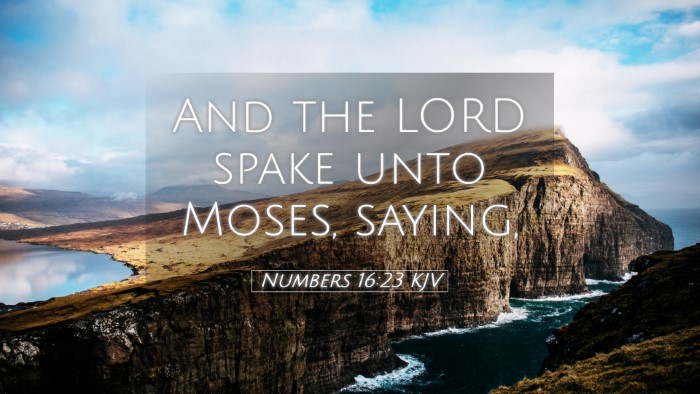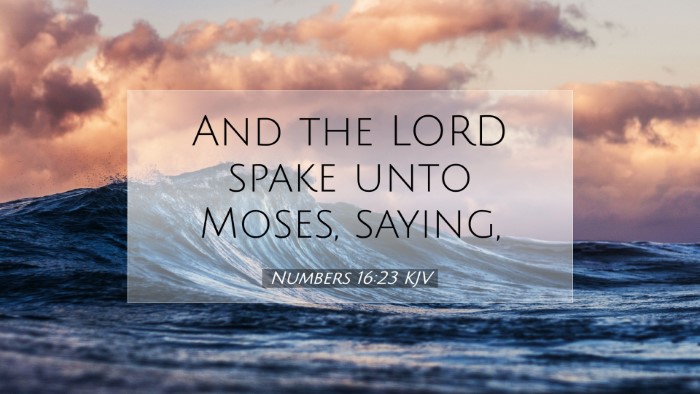Commentary on Numbers 16:23
Verse: "And the LORD spake unto Moses, saying," (Numbers 16:23, KJV)
Introduction
This verse marks a pivotal moment in the narrative of rebellion against the authority of Moses and Aaron within the assembly of Israel. The context of Numbers 16 reveals a profound struggle for leadership, with Korah leading a revolt against the established priesthood. The commentary draws from the insights of plain speakers in biblical exegesis, particularly from Matthew Henry, Albert Barnes, and Adam Clarke, each providing depth to the theological and historical implications of this rebellion and God’s response.
Historical Context
The wilderness wanderings of the Israelites are characterized by crises of faith and leadership. Korah, alongside Dathan and Abiram, questioned the unique role of Moses and Aaron, suggesting a shared holiness among the congregation and challenging the God-ordained structure of leadership.
- Korah's Rebellion: This insurrection reflects the ongoing dissatisfaction of the Israelites, stemming from their prolonged suffering in the wilderness.
- Divine Authority: The verse emphasizes God’s direct communication with Moses, reinforcing that divine authority of leadership is not self-appointed but divinely ordained.
- Consequences of Rebellion: The transgressor’s assumption that all members of the congregation could serve as priests undermined the specific roles assigned by God, leading to severe consequences.
Moses’ Leadership and God’s Response
God’s explicit address to Moses signifies the critical role of the prophet as an intermediary between God and His people. This divine engagement is essential in demonstrating both God’s sovereignty and the gravity of the rebellion.
- Divine Communication: As noted by Clarke, this direct communication underscores that Yahweh is aware of the ongoing conflict and is actively involved in its resolution.
- Call to Action: The subsequent verses (Numbers 16:24) show Moses receiving instructions from God, indicating that God’s response is both corrective and instructional, leading to a significant moment of divine intervention.
- Highlight on Intercession: Moses’ role as a leader faced with rebellion showcases his surrogate leadership; he is tasked with conveying God’s will while empathizing with the people.
Theological Implications
This passage serves as a reminder to leaders and laypersons alike about the essential nature of divine order within God’s community. The consultation between God and Moses reflects the necessity for acknowledgment of divine order in the church today.
- The Nature of Holiness: Korah’s misinterpretation of holiness is a teaching point that holiness is distinct and designated hierarchical roles are set as part of God’s plan. The insights from Barnes highlight the importance of recognizing the appointed leaders as God's instruments.
- Judgment and Mercy: The ensuing judgment reveals divine justice, but it is also a call to mercy. History teaches that God is steadfast, calling His people to repentance while warning against pride and rebellion.
- Role of Prayer and Response: Pastors and spiritual leaders are reminded of the importance of prayer and seeking divine guidance in matters of leadership and community strife.
Practical Applications
This passage, though originating from an ancient context, retains timeless applications for modern faith communities:
- Respect for Authority: The passage encourages respect for those whom God has placed in positions of leadership, warning against rebellion that undermines the unity of the body of Christ.
- Leadership Accountability: Leaders are encouraged to remain accountable to God and to the teachings of Scripture, ensuring they guide their congregations in righteousness.
- Understanding of Church Dynamics: The narrative encourages congregants to understand their roles within the church while fostering an environment of mutual respect and divinely-directed leadership.
Conclusion
Numbers 16:23 provides a significant moment of revelation as God reaffirms His authority amidst human rebellion. The combined insights from historical perspectives and theological reflections reveal the importance of recognizing divine leadership and the intricacies involved in following God’s ordained structure. This passage challenges all involved in spiritual leadership to seek God earnestly and respond appropriately to conflicts while remaining faithful to their divinely appointed roles.


